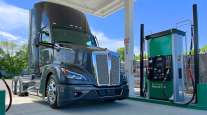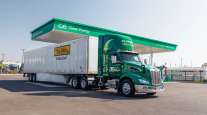Staff Reporter
Cummins, Hyundai Agree to Examine Fuel Cells Together

[Stay on top of transportation news: Get TTNews in your inbox.]
Hyundai Motor Co. and Cummins Inc. said in a joint statement that they have agreed to evaluate opportunities to develop and commercialize electric and fuel cell powertrains.
Both companies, global leaders in powertrain production, are sure to stir a diesel-dependent industry already grappling with the best way to proceed on zero emissions and electric trucks. The vehicles can either be powered by large, bulky batteries, or hydrogen fuel-cells that create electricity.
#Hyundai Motor Company and Cummins Inc. sign MOU to collaborate on Hydrogen Fuel-Cell Technology to develop and commercialize electric and fuel-cell powertrains. Learn more : https://t.co/QbsaLhhJ5P #hydrogen #electric #fuelcell #cleanmobility pic.twitter.com/j5A3x9qw8o
— Hyundai Worldwide (@Hyundai_Global) September 30, 2019
Jon Mills, spokesman for Columbus, Ind.-based engine maker Cummins, told Transport Topics that the partnership with Hyundai builds on a strategy to provide a range of next-generation clean technologies from natural gas to electric to fuel cells.
“We think there will need to be a range of power solutions,” Mills said.
On Sept. 9, Cummins said that it closed on the $290 million acquisition of Hydrogenics Corp., a Canadian fuel cell and hydrogen-production technologies provider. Fuel cells are not new for Cummins. It began developing fuel-cell capabilities more than 20 years ago.
The new powertrains are expected to be developed by combining Hyundai’s fuel-cell systems with Cummins’ electric powertrain, battery and control technologies, they said.
The initial development will be focused on the North American commercial vehicle market, including Class 8 units. The companies will work with North American manufacturers on the integration of the systems into their vehicles, they said.
Hyundai said it hopes the partnership will serve as a “springboard” to increase its presence in the North American commercial vehicle market. Cummins hopes to enhance its electrified power-product portfolio by adding Hyundai’s advanced fuel-cell technologies.
“Collaborations such as this will enable us to further diversify our business, as well as reinforce our global hydrogen leadership through sales of new and existing Hyundai fuel cell systems,” said Saehoon Kim, head of Hyundai’s Fuel Cell Group.

Cummins and Hyundai said the collaboration may extend beyond the commercial vehicle market, with the companies examining power generators based on fuel cells. Such generators could be used as reliable backup power to prevent data loss in emergency situations, the companies said.
Eric Starks, CEO of transportation intelligence agency FTR, said the joint venture is a good step toward the wider acceptance and development of fuel cells for commercial vehicles.
But the “million-dollar question,” said Starks, is when will the transportation industry fully embrace fuel cells, driving more environmentally friendly tractors while making a profit.
“It’s going to be the return on investment. It will probably be a slow adoption rate.”
The trucking industry is already headed in at least two directions regarding the future of zero-emissions fuel. At the Advanced Clean Transportation Expo in Long Beach, Calif., in April, Roger Nielsen, CEO of Daimler Trucks North America, said his company is betting on batteries.
“I believe the future is electric,” Nielsen said. “The road to emissions-free driving will be driven by battery-electric vehicles.”

A Kenworth hydrogen fuel cell truck. (Truck PR/Flickr)
Also at the ACT Expo, UPS Inc. announced it would partner with Kenworth Truck Co. to test 10 fuel cell-powered trucks at the ports of Los Angeles and Long Beach starting in the fourth quarter.
Hyundai opened the world’s first commercial production facility for fuel-cell vehicles in 2013, and released the world’s first commercialized hydrogen-powered vehicle, the Tucson Fuel Cell, in 2015, according to the statement.
Hyundai was established in South Korea in 1967. It sells vehicles in 200 countries. In 2018, it sold more than 4.5 million vehicles globally.
Cummins made 1.3 million engines in 2018, and that year launched its Electrified Power business segment, which designs and manufactures fully electric and hybrid powertrain systems.
Founded in 1919, the company’s products range from diesel and natural gas engines to hybrid and electric platforms, as well as related technologies, including battery systems, fuel systems, controls, air handling, filtration, emission solutions and electrical power generation systems.
Want more news? Listen to today's daily briefing:




